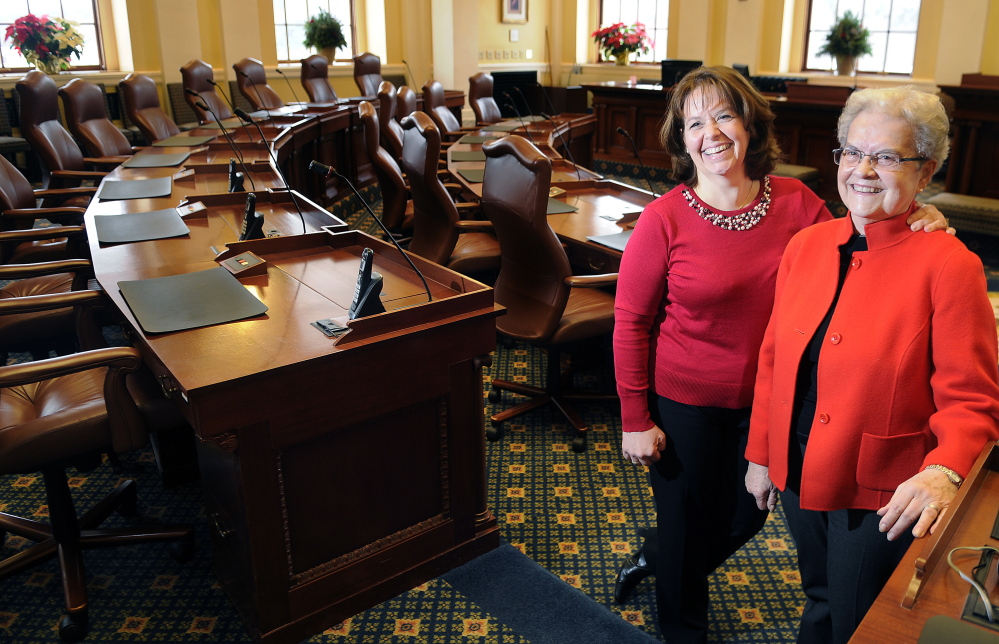AUGUSTA — May M. Ross Coffin looked around the office of the secretary of the Senate, from which she retired in December 1996, ending a 32-year State House career.
“My desk was over in the corner,” she said, pointing, “with a conference table in the middle of the room.”
In contrast, the desk of Heather Priest, Coffin’s daughter, is centered on the window that looks out over the State House front lawn. There is no conference table. Priest’s desk faces the hallway, with a side door providing handy access to the Senate president’s office.
Priest, 50, became secretary of the Senate this month. Coffin, 78, the first woman to be elected as Senate secretary in Maine, in December 1976, said the office remains much the same as in her day.
In continuation of another legacy, Priest was nominated by Sen. Roger Katz, R-Augusta. Katz’s father, Bennett Katz, was the state senator who nominated Coffin to the job in 1976.
“It was a real honor for me to be able to do the same thing for her daughter, a wonderful coincidence for me to do the same thing my dad had done 38 years ago,” Katz said on Tuesday.
The secretary is elected by the members of the Senate, which is now controlled by Republicans. Darek Grant held the post before Coffin.
According to the Rules of the Senate, the secretary of the Senate numbers bills and resolves, transmits messages to the House and governor, forwards Senate or joint orders to affected agencies and records decisions on questions of order as well as appoints staff.
Visitors to the State House will recognize the secretary as the person in the front of the chamber who reads legislation and immediately is interrupted by the Senate president. The process can be confusing to first-time visitors unfamiliar with parliamentary procedure.
Priest checked with the National Conference of State Legislatures to see whether there were other mothers and daughters who had held the same position. Apparently there have been none. However, records from that group showed that Ernest W. Gibson Jr. served as secretary of the Vermont State Senate 1933-40 before becoming a U.S. senator and later governor. His son, Robert Gibson, was secretary to the Vermont State Senate 1967-99 and was succeeded by his brother, David Gibson, who served 2000-10.
Coffin and many extended family members, most of whom live in the Augusta area and have their own government connections, attended Priest’s swearing-in ceremony last week.
Coffin’s husband, former city councilor Ed Coffin, showed a framed black and white photo in the hallway that shows his father, then state Democratic Sen. James Edward Coffin of Cumberland County in 1959-60, seated in front of a young, dark-haired May Ross, then a member of the Senate staff, all of whom are standing in the background.
Priest, who has worked in the State House for 20 years, had been clerk of the House for two years before becoming Republican chief of staff in the Senate in 2012.
Priest’s father, Richard Ross, represented Augusta in the House in 1963, resigning at the end of his first year to take a post on the state parole board. Priest’s sister, Julie O’Brien, was the Republican legislator representing part of Augusta in the House for eight years.
Coffin, 78, who started as a Senate stenographer in 1959 and took a few years off when her husband served and when her children were younger, said she offered her daughter some advice for the clerk’s post early on.
“I told her to be sure to learn the Constitution, the rules and ‘Mason’s Manual of Legislative Procedure,’ ” she said.
Priest did all that. “Absolutely,” she said.
Priest said working for the 35-member Senate is different from working for the 151 members elected to the House.
“With a lot fewer members to work with, you certainly establish closer relationships on both sides of the aisle,” she said.
Coffin agreed. “You end up making friends and getting fond of them,” she said.
Both women cited computerization as the biggest change in the job in the 18 years that separated their tenures.
“Before the last session when I lost the job, the Legislature was not computerized,” Coffin said. “We just had very little on the computer.”
Today there’s a move to implement a paperless chamber.
“It is a slow process to get everybody acclimated,” Priest said even as she watched a color monitor on the side of her desk.
Send questions/comments to the editors.




Success. Please wait for the page to reload. If the page does not reload within 5 seconds, please refresh the page.
Enter your email and password to access comments.
Hi, to comment on stories you must . This profile is in addition to your subscription and website login.
Already have a commenting profile? .
Invalid username/password.
Please check your email to confirm and complete your registration.
Only subscribers are eligible to post comments. Please subscribe or login first for digital access. Here’s why.
Use the form below to reset your password. When you've submitted your account email, we will send an email with a reset code.